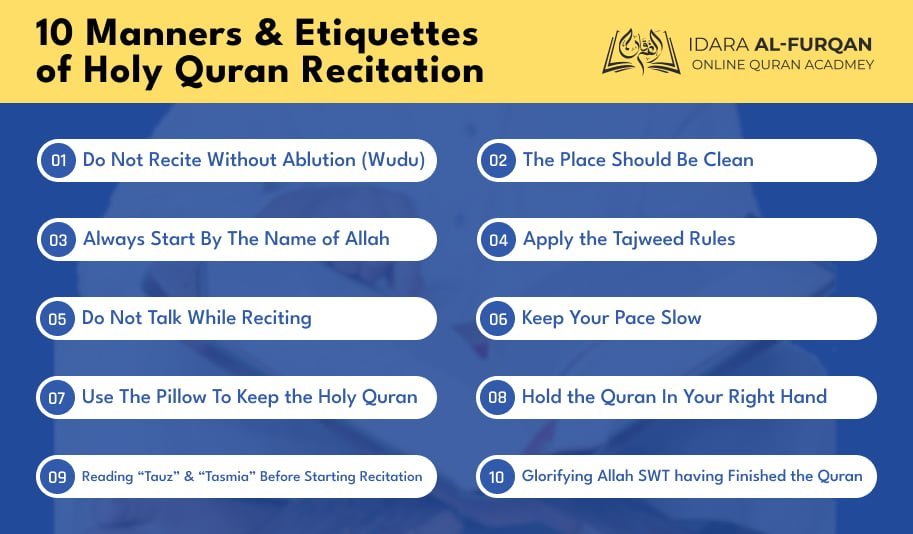
The Quran is a special and respected book for Muslims worldwide. Every Muslim holds it in high regard and seeks guidance from its words, which are considered the words of Allah. However, not everyone knows the proper manners when reading or reciting it. Many unknowingly make mistakes, from how they hold the book to their posture while reading. It’s important to understand the etiquette of reciting the Quran. In addition to this, you can also learn how to recite the Quran online from home. Before starting an online Quran course, let’s explore 10 manners & etiquette every Muslim should follow when reading the Holy Quran.
Table of Contents

Do Not Recite Without Ablution (Wudu)
Wudu cleanses your body. Before we start reading the words of Allah, we must be in a state of purity. You can only make yourself pure when you do the Wudu. Besides that, the importance of doing wudu has increased significantly due to the coronavirus as Wudu saves you from the coronavirus.
In addition to this, it also saves you from a lot of other diseases as well. So it is very important to do wudu whenever you tend to recite the Holy Quran. You should not even touch the Holy Quran when you are not in the state of Ablution.
The Place Should Be Clean
Select a serene and clean environment for Quranic recitation. A tidy space contributes to a focused and respectful atmosphere, emphasizing the sanctity of the experience.
Always Start By The Name of Allah
Being Muslims, we usually start our work by the name of Allah. No matter how small the work is, some people have made it their habit to do anything after taking the name of Allah. The same is the case with Quran recitation.
But its importance increases many times when it is about the Quran. Whether you are reciting the Quran or just reading it, always behind with His name. There is only one Surah where you do not need to take the name of Allah when reading or reciting the Quran. It is Surah Tawbah.
Apply the Tajweed Rules
The Holy Quran needs to be recited with great care in terms of its correct pronunciation as Arabic is a highly complex language and a little error could lead to a change in the true meaning of the words. Besides, it should also be read in a very striking and attractive tone as Rasulullah ﷺ has been narrated to have said:
“He is not one of us who does not make his voice beautiful with the Quran.” (Bukhari and Muslim)
Hence, reading this highly Revered Scripture of Allah SWT requires one to be concerned about fulfilling its due esteem concerning Tajweed regulations.
Do Not Talk While Reciting
Maintain a tranquil ambiance by refraining from unnecessary conversation during Quranic recitation. This etiquette fosters concentration and allows for a more profound connection with the verses.
Keep Your Pace Slow
Slow and deliberate reading enables better comprehension and absorption of the Quranic message. Embrace a measured pace, allowing the profound meanings to resonate within your heart.
Use The Pillow To Keep the Holy Quran
Some people keep the Holy Quran in their hands. It is magnificent, and there is nothing odd in it. But some people do not want to hold it in their hands. So they should keep a pillow in front of them and place the Quran in it for recitation.
Using a pillow provides support. In this way, the reciters do not have to keep the Quran in their hands. The pillow should be clean, and you should sit respectably for reciting the Quran.
Hold the Quran In Your Right Hand
Handle the Quran with your right hand, signifying respect and acknowledging the sacred nature of the text. This physical gesture underscores the significance of the Quranic teachings.
Reading “Tauz” & “Tasmia” Before Starting Recitation
Commence your recitation by seeking refuge with Allah from the influence of Satan (A’udhu billahi min ash-shaytan ir-Rahim) and expressing reliance on Him through “Bismillah ir-Rahman ir-Rahim.” These phrases set the stage for a spiritually enriched reading experience.
Glorifying Allah SWT having Finished the Quran
Upon completing your Quranic journey, take a moment to express gratitude and glorify Allah. Reflect on the privilege of engaging with His divine words, fostering a sense of fulfillment and spiritual connection.
Conclusion
Incorporating these 10 manners and etiquettes into your Quranic reading routine elevates the experience from a mere activity to a spiritual journey. Embrace these practices to deepen your connection with the Holy Quran and draw closer to the divine wisdom it imparts.
FAQs
- Why is it essential to perform Wudu (ablution) before reciting the Quran?
- Wudu is a state of physical and spiritual purity. It’s necessary before handling the Quran to show respect and reverence for the sacred text.
- Is there a specific place or setting recommended for Quran recitation?
- A clean and peaceful environment is recommended to honor the sanctity of the Quran. Choose a quiet, clean space, if possible.
- Should I recite a specific phrase before starting to read the Quran?
- Yes, beginning with “Bismillah” (In the name of Allah) demonstrates respect and invokes blessings before engaging with the Quran.
- What are Tajweed rules, and why are they important?
- Tajweed rules are guidelines for proper Quranic pronunciation. They enhance the beauty of recitation and ensure accurate enunciation of Arabic letters and sounds.
- Is it permissible to recite the Quran aloud or silently?
- Both methods are acceptable. Reciting silently aids personal reflection while reciting aloud helps improve pronunciation and memorization.
- How should I handle the physical Quran during recitation?
- Treat the Quran with utmost respect. Use a clean surface or a Quran stand/pillow to keep it elevated during recitation.
- Is it allowed to recite the Quran while lying down or in a reclined position?
- It’s preferable to sit respectfully while reciting the Quran. However, if sitting is difficult due to health reasons, reciting while lying down is acceptable.
- Are there any recommended closing phrases or acts after completing the Quranic recitation?
- After finishing recitation, praising Allah (SWT), seeking His blessings, and making prayers are encouraged acts to conclude this spiritual practice.
Read Also
12 Scientific Facts in the Holy Quran
Why Should We Learn the Quran Online?
Virtues and Significance of Friday in Islam
Rabi al Awwal – All You Need to Know
Importance of Online Quran Learning
Benefits of Reciting the Quran
Marriage in Islam – All You Need to Know
Idara al Furqan Academy: A Modern Way To Learn Quran
Why Should You Recite the Quran Daily?


